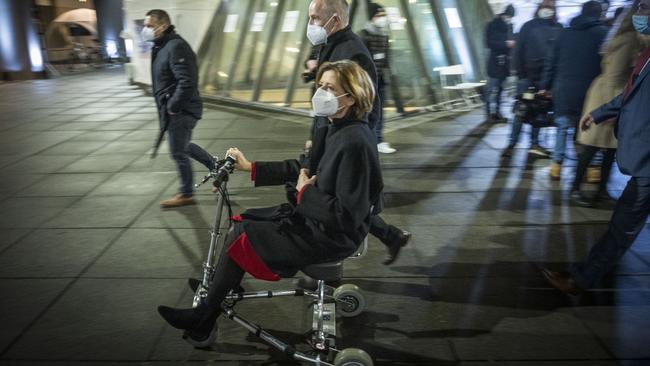Angela Merkel heir could pay price after election drubbing
The Christian Democratic Union was projected to be trounced in the states of Baden-Wurttemberg and Rhineland-Palatinate.

The race to succeed Angela Merkel was blown wide open on Monday when her party suffered historically poor results in two regional votes that mark the start of the general election campaign.
The chancellor’s centre-right Christian Democratic Union was projected to be trounced by a margin of about eight percentage points in the southwestern states of Baden-Wurttemberg and Rhineland-Palatinate, the party’s worst performances in each state.
The ballot box rebuffs suggest that the dominance the CDU has enjoyed since the start of the pandemic may be weakening after a sleaze scandal and growing dissatisfaction with the handling of the coronavirus crisis.
They are likely to turn up the political heat on Armin Laschet, the party’s new leader, who hopes to replace Ms Merkel in September.
Mr Laschet’s travails may open a path for his arch-rival, Markus Soder, 54, the Bavarian chief minister, to run for the post of chancellor. The results will also encourage the CDU’s two closest competitors, the left-of-centre Social Democrats (SPD) and the Greens, who were expected to win Rhineland-Palatinate and Baden-Wurttemberg respectively.
Norbert Rottgen, a senior CDU MP who was defeated by Mr Laschet in the party’s leadership contest, said it was conceivable that his party could find itself driven out of government in September. “These are sad results in what was once the core territory of the CDU,” he said.
The CDU held a commanding position in the polls last year, suggesting that the party and its Bavarian affiliate, Mr Soder’s Christian Social Union, would emerge as the strongest force in the Bundestag election this northern autumn with about 35 per cent of the vote.
That advantage is crumbling. A national poll published on Sunday by Bild am Sonntag suggested that support for the bloc had fallen to 31 per cent, two points less than it won in 2017. Three of its MPs have resigned over the past week after they were accused of having profited from the pandemic, although all have denied wrongdoing.
Surveys also indicate that the approval ratings for some of the CDU’s leading ministers are in freefall. Almost three quarters of voters believe that the government has mishandled the vaccination program.
The unease came to a head on Sunday in the two regional votes. At several stages during its coronavirus honeymoon last year, the party had opened up a lead in both states.
In Rhineland-Palatinate, the home state of Helmut Kohl, the CDU’s totemic former chancellor, the party had been expected to push the SPD — led by Malu Dreyer — down to the wire for first place. Early projections put it on 26 per cent of the vote to the SPD’s 34 per cent. The CDU was forecast to lose by a similar margin in Baden-Wurttemberg, where initial estimates suggested that it had won only 23 per cent of the vote, well behind the Green party’s 32 per cent.
The forecasts were a little less reliable than is usual in German elections because of the high proportion of postal votes but the margin of victory in both states appeared to be decisive. It is even possible that the CDU may lose its place in Baden-Wurttemberg’s state government if Winfried Kretschmann, 72, the Green chief minister, chooses to discard the party as his junior coalition partner.
The CDU’s opponents rejoiced at the results. Robert Habeck, 51, the co-leader of the Greens, hailed a “super start to this super election year”. Olaf Scholz, the finance minister, who is leading the SPD into the election, said: “I want to be chancellor. Today it’s become clear that this is possible.”
There is still time for Mr Laschet, 60, the chief minister of the western state of North Rhine-Westphalia, to rebuild his case to stand as the CDU and CSU’s joint candidate for the chancellorship.
The nomination is not expected to be decided until next month.
The Times



To join the conversation, please log in. Don't have an account? Register
Join the conversation, you are commenting as Logout